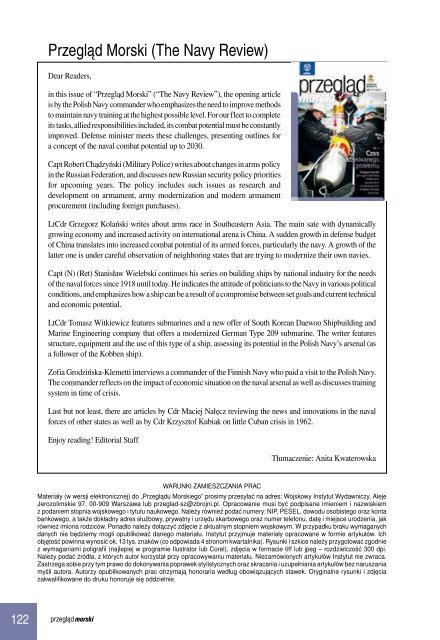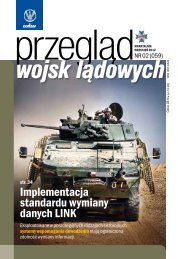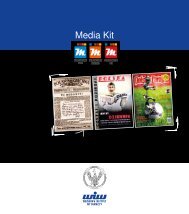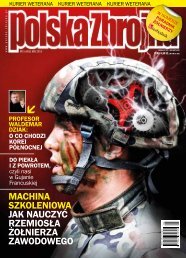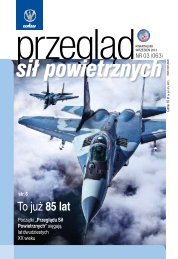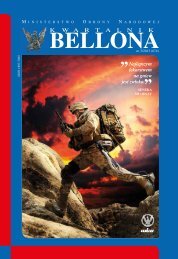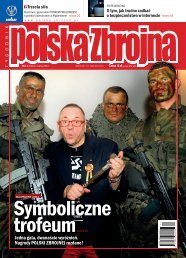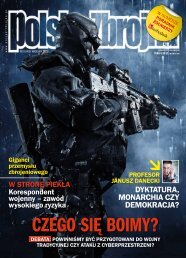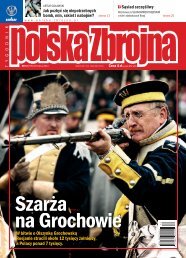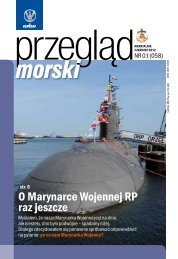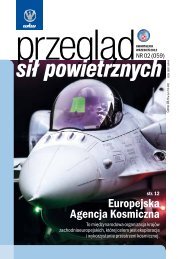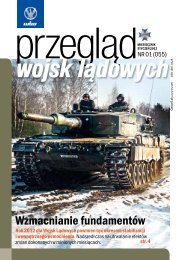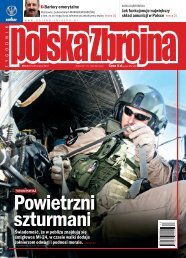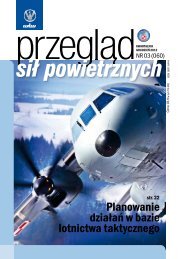Pobierz - Ministerstwo Obrony Narodowej
Pobierz - Ministerstwo Obrony Narodowej
Pobierz - Ministerstwo Obrony Narodowej
You also want an ePaper? Increase the reach of your titles
YUMPU automatically turns print PDFs into web optimized ePapers that Google loves.
Przegląd Morski (The Navy Review)<br />
Dear Readers,<br />
in this issue of “Przegląd Morski” (“The Navy Review”), the opening article<br />
is by the Polish Navy commander who emphasizes the need to improve methods<br />
to maintain navy training at the highest possible level. For our fleet to complete<br />
its tasks, allied responsibilities included, its combat potential must be constantly<br />
improved. Defense minister meets these challenges, presenting outlines for<br />
a concept of the naval combat potential up to 2030.<br />
Capt Robert Chądzyński (Military Police) writes about changes in arms policy<br />
in the Russian Federation, and discusses new Russian security policy priorities<br />
for upcoming years. The policy includes such issues as research and<br />
development on armament, army modernization and modern armament<br />
procurement (including foreign purchases).<br />
LtCdr Grzegorz Kolański writes about arms race in Southeastern Asia. The main sate with dynamically<br />
growing economy and increased activity on international arena is China. A sudden growth in defense budget<br />
of China translates into increased combat potential of its armed forces, particularly the navy. A growth of the<br />
latter one is under careful observation of neighboring states that are trying to modernize their own navies.<br />
Capt (N) (Ret) Stanisław Wielebski continues his series on building ships by national industry for the needs<br />
of the naval forces since 1918 until today. He indicates the attitude of politicians to the Navy in various political<br />
conditions, and emphasizes how a ship can be a result of a compromise between set goals and current technical<br />
and economic potential.<br />
LtCdr Tomasz Witkiewicz features submarines and a new offer of South Korean Daewoo Shipbuilding and<br />
Marine Engineering company that offers a modernized German Type 209 submarine. The writer features<br />
structure, equipment and the use of this type of a ship, assessing its potential in the Polish Navy’s arsenal (as<br />
a follower of the Kobben ship).<br />
Zofia Grodzińska-Klemetti interviews a commander of the Finnish Navy who paid a visit to the Polish Navy.<br />
The commander reflects on the impact of economic situation on the naval arsenal as well as discusses training<br />
system in time of crisis.<br />
Last but not least, there are articles by Cdr Maciej Nałęcz reviewing the news and innovations in the naval<br />
forces of other states as well as by Cdr Krzysztof Kubiak on little Cuban crisis in 1962.<br />
Enjoy reading! Editorial Staff<br />
Tłumaczenie: Anita Kwaterowska<br />
Warunki zamieszczania prac<br />
Materiały (w wersji elektronicznej) do „Przeglądu Morskiego” prosimy przesyłać na adres: Wojskowy Instytut Wydawniczy, Aleje<br />
Jerozolimskie 97, 00-909 Warszawa lub przeglad-sz@zbrojni.pl. Opracowanie musi być podpisane imieniem i nazwiskiem<br />
z podaniem stopnia wojskowego i tytułu naukowego. Należy również podać numery: NIP, PESEL, dowodu osobistego oraz konta<br />
bankowego, a także dokładny adres służbowy, prywatny i urzędu skarbowego oraz numer telefonu, datę i miejsce urodzenia, jak<br />
również imiona rodziców. Ponadto należy dołączyć zdjęcie z aktualnym stopniem wojskowym. W przypadku braku wymaganych<br />
danych nie będziemy mogli opublikować danego materiału. Instytut przyjmuje materiały opracowane w formie artykułów. Ich<br />
objętość powinna wynosić ok. 13 tys. znaków (co odpowiada 4 stronom kwartalnika). Rysunki i szkice należy przygotować zgodnie<br />
z wymaganiami poligrafii (najlepiej w programie Ilustrator lub Corel), zdjęcia w formacie tiff lub jpeg – rozdzielczość 300 dpi.<br />
Należy podać źródła, z których autor korzystał przy opracowywaniu materiału. Niezamówionych artykułów Instytut nie zwraca.<br />
Zastrzega sobie przy tym prawo do dokonywania poprawek stylistycznych oraz skracania i uzupełniania artykułów bez naruszania<br />
myśli autora. Autorzy opublikowanych prac otrzymają honoraria według obowiązujących stawek. Oryginalne rysunki i zdjęcia<br />
zakwalifikowane do druku honoruje się oddzielnie.<br />
122<br />
przegląd morski


